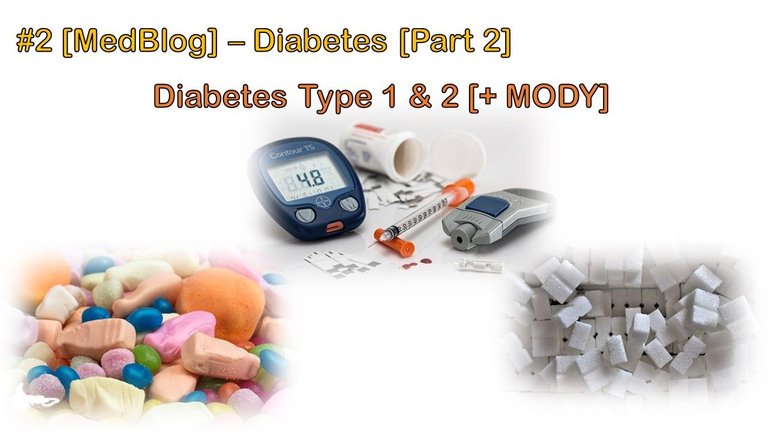
Greetings,
based on the last episode we will talk a bit more in depth about the different types of Diabetes, especially Type 1, Type 2 and the so-called MODY (Maturity-Onset Diabetes of the Young). First of all we will clarify the function of insulin as such to understand the following information.
As always we try to keep it as crisp & clear as possible. Let’s head on!
Pancreas & Insulin
The pancreas is a gastro-intestinal organ primarily important for digestion & the relating hormone output. There is an endocrine (2%) and exocrine (98%) part meaning the endocrine part secretes hormones into the blood while the exocrine part secretes different enzymes into the gastrointestinal tract to break down the food into its molecular bits & pieces.
The one hormone important for us is insulin. Insulin is secreted as a response to the increase of blood sugar after food intake – so summed up the sugar in the blood is interaction with β-cells of the pancreas and cause a series of biochemical reactions resulting into the output & production of insulin (usually there is a big amount of insulin stored in so-called vesicles, little cellular bubbles, ready to be secreted).
To keep it short the insulin interacts with different kind of receptors all around the human body and induce different kind of effects – generally speaking you can say that insulin is boosting the anabolic metabolism. Doing so we see e.g. increased integration of glucose transporters (GLUT) in the membrane of different kind of cells, which will result into a higher import of glucose in the cells and a decrease of the overall blood sugar.
Diabetes Type 1
So basically, the occurrence of Diabetes Type 1 [DMT1] is an autoimmune disease, where the own body destroys the so-called β-cells of the pancreas. Depending on your genes you have the susceptibility to be sick with DMT1. Usually regarding the family history, we see a cumulation of autoimmune diseases [e.g. systemic lupus erythematosus (SLE) & rheumatoid arthritis (RA)] – so in addition to that we see a certain trigger (e.g. a viral infect or similar) that initiates the incorrect autoimmune response of the body. First symptoms occur when usually more than 80 % of the β-cells are destroyed
Generally speaking, you can say that DMT1 occurs at a young age & progresses extremely rapidly - there are exceptions like the so-called Late Autoimmune Diabetes in Adults [LADA], but that should not bother us at this moment. There it is important to intervene therapeutically as quick as possible [how in detailed will be spoken about in the next episode!]
Diabetes Type 2
Diabetes Type 2 [DMT2] is the result of a long process meaning that it is a chronic disease. The diagnose of DM usually takes place after disease-related complications.
With a high chance it is the result over time of the metabolic syndrome including adiposity/obestiy.
The key problem and reason for DMT2 is a so-called “insulin resistance” meaning the insulin does not anymore trigger the corresponding effects on the metabolism as normally – therefore there is no insulin-induced import of sugar into the cells from the blood.
There are a lot of theories and facts on how the overload of sugar & fats interact with the metabolism and lead to the insulin resistance, but that would be really in depth and not enjoyable for you guys, I guess.
Nethertheless we should emphasise on the fact that a not well therapied DMT2 can also lead to a destruction of the β-cells on the long run – so in the beginning you usually have a hyperinsulinemia [high blood insulin] while later resulting into a decrease of insulin production due to the high workload and toxic sediments.
MODY: Maturity-Onset Diabetes of the Young
This includes all forms of autosomal-dominant passed Diabetes types based on a monogenetic defect of the β-cells function. It does not occur in combination with adiposity or autoantibodies and usually starts around the age of 25-35 years.
Sometimes it also becomes manifest in a “gestational diabetes” (diabetes occurring during pregnancy due to the changing hormone profile)
Checklist
By now ...
✅ you know the cause for Diabetes Type 1
✅ you know the cause for Diabetes Type 2
✅ you know roughly the function of insulin & the pancreas
I am really excited about this series and are happy to contribute to the community - see you soon!
Noogie 🙋♂️
What's Next?
We will talk about the different options of therapy as well as diagnostic options to identify each different type of Diabetes as a disease. In addition, we round up the whole topic!
Disclaimer
The content shown here is no alternative to consulting a doctor – if you have any kind of health issues bothering you, firstly consider visiting a health-expert. This is just meant to feed your personal interests.
I really appreciate this kind of articles. Thanks for sharing.
!discovery 35
Thanks for the great feedback - means a lot to me!
Congratulations @noogie! You have completed the following achievement on the Hive blockchain and have been rewarded with new badge(s) :
You can view your badges on your board and compare to others on the Ranking
If you no longer want to receive notifications, reply to this comment with the word
STOPDo not miss the last post from @hivebuzz:
Vote for us as a witness to get one more badge and upvotes from us with more power!
Questo post è stato condiviso e votato all'interno del discord del team curatori di discovery-it Entra nella nostra community! hive-193212
This post was shared and voted inside the discord by the curators team of discovery-it. Join our community! hive-193212